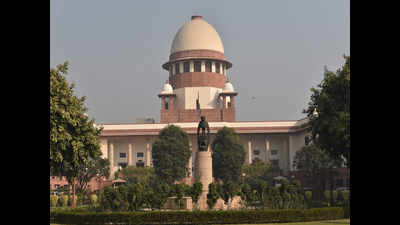- News
- City News
- gurgaon News
- Will SC prod get war on pollution on track?
Trending
This story is from January 19, 2017
Will SC prod get war on pollution on track?

The Supreme Court
GURGAON: The Haryana State Pollution Control Board (HSPCB) and the city’s civic agencies on Wednesday said they were gearing up to conduct inspections of construction sites, pollution checking centres and polluting industries.
This came a day after the Supreme Court warned that urgent measures are required to bring down air pollution levels in Delhi-NCR.
Most measures taken in the city, which on days is even more polluted than India’s worst offender, Delhi, have either been inadequate, short-term or just token steps.There is no long-term plan of action to fight pollution.
The apex court has directed states with poor air quality to take immediate action against all contributing factors to air pollution, including 100% compliance of pollution under control (PUC) certificates to vehicles, installation of real-time air quality monitoring system, mechanised cleaning of road, installation of sprinklers on road, and banning of construction activities, if pollution reaches alarming levels.
The road and transport authority (RTA), on the other hand, is planning to link the PUC certificates with the renewal of insurance of vehicles. “We are planning to work on such a mechanism. It will, however, take some time for implementation,” said an official from RTA.
The district administration, however, is still unsure of the implementation of the odd-even scheme due to poor public transport system.
“Unlike Delhi, Gurgaon doesn’t have adequate public transport infrastructure to implement the odd-even scheme. There have been requests to stop diesel autos from plying owing to high amount of air pollution caused by them. However, that has not been possible as autos provide the last-mile connectivity in the city,” said an official.
Currently, the city has only 170 buses but at least 15,000 diesel autos.
This came a day after the Supreme Court warned that urgent measures are required to bring down air pollution levels in Delhi-NCR.
Most measures taken in the city, which on days is even more polluted than India’s worst offender, Delhi, have either been inadequate, short-term or just token steps.There is no long-term plan of action to fight pollution.
The apex court has directed states with poor air quality to take immediate action against all contributing factors to air pollution, including 100% compliance of pollution under control (PUC) certificates to vehicles, installation of real-time air quality monitoring system, mechanised cleaning of road, installation of sprinklers on road, and banning of construction activities, if pollution reaches alarming levels.
“Even though we have been working continuously as a regulatory authority to bring down air pollution, after directions from the Supreme Court and the Central Pollution Control Board, we are now planning to accelerate the inspection mechanism on construction units measuring more than 20,000 square feet, brick kilns and polluting industries. However, majority of steps mentioned in the direction are to be taken by civic agencies,” said Bhupender Singh, regional officer, HSPCB.
The road and transport authority (RTA), on the other hand, is planning to link the PUC certificates with the renewal of insurance of vehicles. “We are planning to work on such a mechanism. It will, however, take some time for implementation,” said an official from RTA.
The district administration, however, is still unsure of the implementation of the odd-even scheme due to poor public transport system.
“Unlike Delhi, Gurgaon doesn’t have adequate public transport infrastructure to implement the odd-even scheme. There have been requests to stop diesel autos from plying owing to high amount of air pollution caused by them. However, that has not been possible as autos provide the last-mile connectivity in the city,” said an official.
Currently, the city has only 170 buses but at least 15,000 diesel autos.
End of Article
FOLLOW US ON SOCIAL MEDIA










